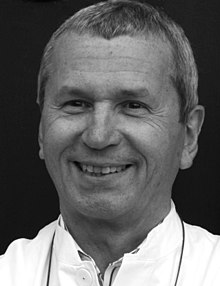Horst Laqua
Horst Laqua (born March 28, 1943 in Breslau ) is a specialist in ophthalmology . From 1984 to March 2008 he was head of the Ophthalmology Clinic at the University of Lübeck .
education
After graduating from high school in Hanover in 1962, Horst Laqua began studying human medicine in Heidelberg . In 1964 he moved to Vienna , then to Innsbruck and finally in 1965 to Göttingen , where he finished his studies with the medical state examination in 1967. At the end of his medical assistant, Horst Laqua received his doctorate in 1969 from the Göttingen radiologist Hanno Poppe on the subject of "Early changes in the bones of adult dogs after a single X-ray exposure, shown with the tetracycline mark".
Scientific career
In 1970 Horst Laqua began his specialist training in ophthalmology at the University Eye Clinic in Göttingen . In 1973 he went to the Bascom Palmer Eye Institute (part of the School of Medicine at the University of Miami ) in Miami , Florida to study with Robert Machemer , the founder of vitrectomy (surgical removal of vitreous humor) as a training scholarship from the German Research Foundation . There he initially worked experimentally in the field of vitreous and retinal pathology. After two years of scientific work, he received a neuro-ophthalmological training and a clinical year in which he learned how to perform vitrectomy. After returning to Germany, he became a senior physician at the University Eye Clinic in Tübingen , where he introduced the vitrectomy. In 1978 he completed his habilitation in Tübingen with the thesis: "Cellular origin and clinical significance of intraocular membranes in experimental retinal detachment ". After moving to the University Eye Clinic in Essen as a senior physician in 1979, Horst Laqua was appointed temporary (C3) professor there in 1982. On April 1, 1984, Horst Laqua accepted a professorship for ophthalmology at the Medical University of Lübeck and was appointed professor for life. He turned down a later call to the chair for ophthalmology at the Free University of Berlin . In 1990 he was appointed Scientific Director at the Medical Laser Center in Lübeck. He was medical director of the hospital and from 1996 to 1998 dean of the medical faculty of the University of Lübeck. On March 31, 2008 he retired after 24 years as head of the eye clinic at the university clinic.
Services
Horst Laqua was one of the first in Germany to introduce pars plana vitrectomy and silicone-oil surgery into clinical routine. His particular skill was in assessing complicated retinal situations and performing reattaching surgical techniques. In collaboration with Reginald Birngruber, who later became the head of the Medical Laser Center in Lübeck, he made ophthalmic laser medicine a further clinical and scientific focus of the Lübeck Eye Clinic. In 1987 he initiated the establishment of the Retinological Society in Lübeck-Travemünde and was a member of the board for many years. In his scientific work he dealt with the pathogenesis and surgical therapy of proliferative vitreoretinopathy , the development of photodynamic therapy , with laser technologies and the development of optical coherence tomography for the anterior segment of the eye. Laqua has signed more than 320 publications. Four of his employees have received a chair for ophthalmology (Ursula Schmidt-Erfurth, Vienna; Johann Roider, Kiel; Hans Hoerauf, Göttingen; Gerd Geerling , University Eye Clinic Düsseldorf ).
Web links
- Farewell symposium of the Schleswig-Holstein University Medical Center for Prof. Horst Laqua
- Dedication booklet for Prof. Dr. med. Horst Laqua. Georg Thieme Verlag, clinical monthly sheets for ophthalmology 2008; 225 (3): 191
- Retinological Society
Publications
- Silicone Oil in the Treatment of Complicated Retinal Detachments: Techniques, Results, and Complications . Springer-Verlag 1990, ISBN 978-3642842689
| personal data | |
|---|---|
| SURNAME | Laqua, Horst |
| BRIEF DESCRIPTION | German specialist in ophthalmology and university lecturer |
| DATE OF BIRTH | March 28, 1943 |
| PLACE OF BIRTH | Wroclaw |
